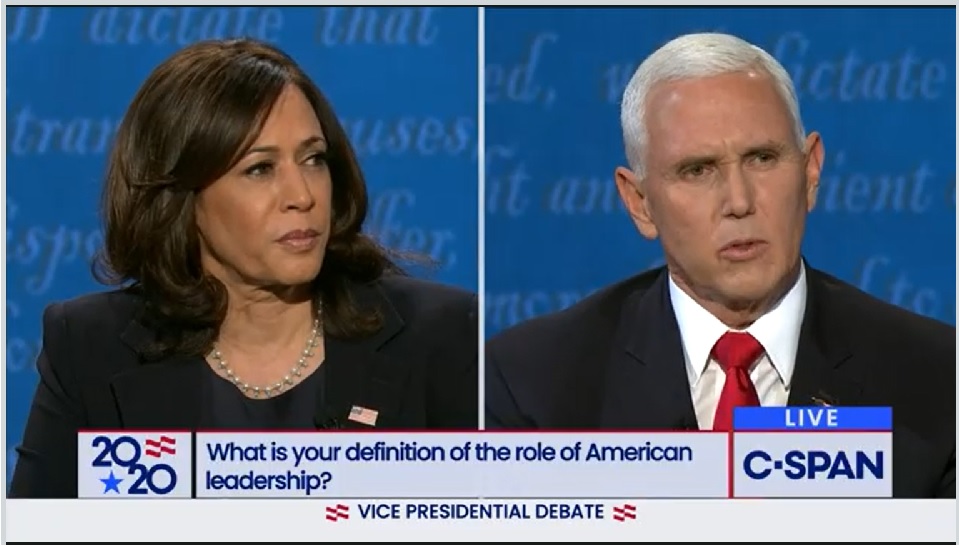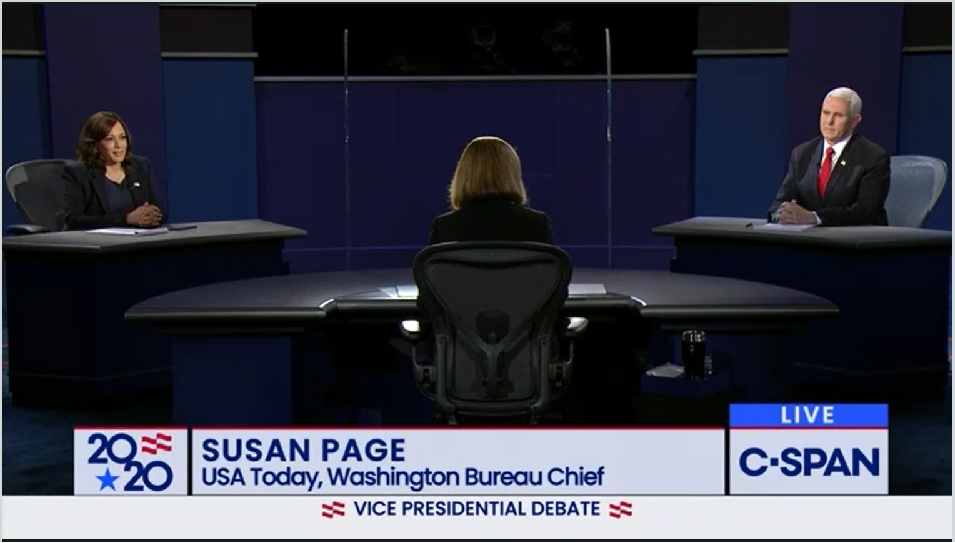
Sen. Kamala Harris and Vice President Mike Pence face off at the Oct. 7 vice presidential debate. (NCR screenshot)
Journalists were all excited in advance about last night's vice-presidential debate. Alice Stewart, at CNN, voiced an opinion that was uttered frequently in the past 48 hours:
Vice presidential debates are very much the undercard, but it's impossible to overplay the significance of Wednesday night's face-off between Vice President Mike Pence and California Sen. Kamala Harris. Never before has there been a scenario when either presidential candidate could potentially be unable to fulfill a full term — both major candidates are in their 70s. This vice-presidential debate will be a job interview unlike any other.
I will stipulate that 2020 is a year unlike any other. And, yes, both presidential candidates are in their 70s and one of the two is afflicted with a deadly virus.
But this election is a referendum on Donald Trump, not Mike Pence. More specifically, the election has become a referendum on Trump's handling of the coronavirus, which points to the first reason last night's debate was interesting: As head of the White House Coronavirus Task Force, Pence had a tall order in seeking to defend the administration's dismal record.
He did not succeed. Moderator Susan Page, from USA Today, led the debate with a question about the pandemic and Pence focused on the administration's confidence in the American people to make their own decisions. "We trust the American people," he said solemnly. But he dodged the question of why the death rate in the United States is so much higher than in other modern, industrialized countries. Only once did he score a hit, and this was a bit later in the debate, when he looked at Harris and urged her to "stop playing politics with peoples' lives." Harris did not respond to this.
In that opening round about the virus, Harris was strong, repeatedly coming back to the theme that Pence and Trump did not level with the American people. She failed to point out that the White House is currently a coronavirus hotspot, which was one of several missed opportunities last night. Still, right at the beginning, and on this most important issue, she looked straight into the camera and spoke to the American people as Joe Biden had done last week.
Advertisement
Throughout the evening, an interesting difference emerged: Pence tended to repeat themes that would play well with the GOP base, but not necessarily reach out to the center of the electorate. On the topic of abortion, he repeated his pro-life commitments but refused to answer what he thought the law should be in Indiana if Roe v. Wade were overturned. But he repeated themes — lower taxes, less regulation, calling Harris "the most liberal Senator" — that play to the GOP base.
Harris, on the other hand, seemed like she was speaking to the center of the electorate. She did not dwell on Roe at all, but brought the conversation about the Supreme Court back to the need to protect the Affordable Care Act (ACA). Her discussion about climate change led with the creation of jobs. On the economy, she recalled a time when America invested in innovation, a nostalgic appeal that surprised me, but the theme was reassuring, not radical.
One other thing Harris did that I did not anticipate seemed effective: She added little stories to her account of the news. When asked about the need for transparency regarding the health of the elderly presidential nominees, Harris pivoted to expand the issue to transparency about taxes, citing the recent New York Times story about Trump's taxes.
Harris said that when someone told her about the story, that Trump had only paid $750 in recent years, she assumed they meant $750,000. It was a very effective way to dramatize the outrageousness of this administration's behavior and claims.

The vice presidential debate between Sen. Kamala Harris and Vice President Mike Pence was moderated by USA Today Washington Bureau Chief Susan Page. (NCR screenshot)
Harris dropped the ball on confronting Pence, and keeping the heat on, regarding the administration's effort to strip away the protection for those with preexisting conditions that first came into existence through the ACA. And, during the discussion of foreign policy, I wish she had pointed out that several generals have abandoned this administration because they concluded, essentially, that the president is not mentally competent.
Harris, like Biden last week, declined to directly answer the question about whether or not the Democrats would seek to pack the Supreme Court if they win the election. They need to come up with an answer to this question and that answer is no.
Pence, on the other hand, like his master, told more lies than I could count.
Pence's continual interruptions of the moderator, along with his condescending attitude towards Harris, became more and more grating as the evening wore on. I did not count the number of times Page had to tell Pence that he had gone past his allotted time, but it was a lot.
Harris kept a smile on her face, said repeatedly, "I am speaking now," said "I will not be lectured…," and grew stronger as the night went on. That last doesn't help because I think plenty of people did not make it through the full 90 minutes. But so many women across America know what it is like to be lectured by guys that there is now a word to describe the phenomenon: mansplain. Harris wasn't having it.
Vice presidential debates have provided some of the most entertaining moments in debate history. Who can forget Sen. Lloyd Bentsen's brutal reply to Sen. Dan Quayle when the latter mentioned he had as much experience as John Kennedy had when he ran for the presidency? Or Ross Perot's running mate Admiral James Stockdale's opening comments of "Who am I? Why am I here?" at the 1992 debate?
But neither of those two evenings made a bit of difference to the elections of which they were a part. And I suspect last night's debate had little or no effect on the current race either.
[Michael Sean Winters covers the nexus of religion and politics for NCR.]
Editor's note: Don't miss out on Michael Sean Winters' latest. Sign up and we'll let you know when he publishes new Distinctly Catholic columns.




